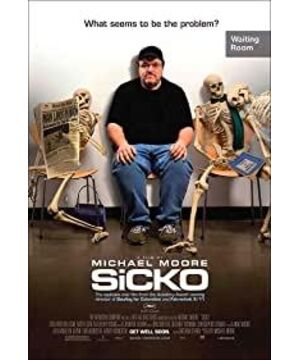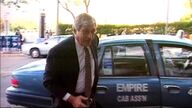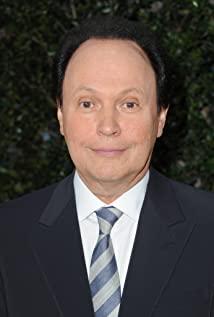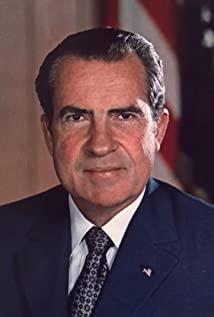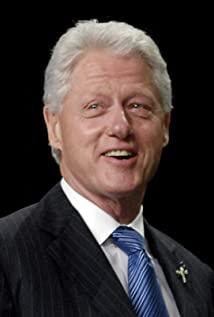"Medical Insider" is a documentary produced by Michael Moore, a "very controversial" filmmaker in the United States. It exposes the common dark side of the U.S. health insurance system and once again smashed the American ruling class’s reliance. The "American Dream" created by mainstream media and cultural hegemony. Moore is known for his satirical documentaries on current affairs. His famous works include Bowling for Columbine (2002), which explores the culture of gun violence in the United States, and Fahrenheit 9/11, which criticizes Bush’s war on terrorism. Fahrenheit 911, 2004), and "Capitalism: A Love Story" (2009) which dissected the financial crisis, it can be said that every film is a mockery of American construction.
[separator]
As the richest and most powerful country in the world, the United States is the only country without a universal health care (insurance) system. Health care is a commodity bought and sold by private consortia. Insurance companies, pharmaceutical companies, and private hospitals are privatizing and The market-oriented medical system makes a lot of money, but many poor people have been denied the basic right to access medical services because they cannot afford expensive medical insurance (Sorry, under capitalism, or at least under American capitalism, medical care is a commodity , Is the privilege of the rich who can afford it!).
The film was taken before the passage of the 2010 Health Care Reform Act in the United States, so it was stated at the beginning that about 50 million Americans do not have health insurance. Even if Obama’s health care reform bill passed through difficult obstacles in March 2010, at least 5% of Americans still do not have health insurance. However, "Medical Insider" tells not the story of people without medical insurance, but the tragic experience of those who thought they could be relieved with medical insurance but were denied medical treatment when they fell ill. The director really found the professions and doctors who used to work in insurance companies with "magic power", and revealed how insurance companies can increase the company's profit by increasing bonuses to gatekeepers who refuse more patients.
The debate on the American medical system has been around for a long time. The anti-communist propaganda during the Cold War in the 1950s described universal medical care as making people lose their freedom and moving towards the Stalinist Soviet totalitarian "socialism." Although today, the United States has undergone Obama’s "tragic victory" in the health care reform, the "red terror" Cold War mentality is still lingering. This is reflected in the right-wingers who oppose the health care reform and those who accuse Obama of wanting to implement society in the United States. "Tea Party" of socialism. Those right-wingers who have always lived in the age of dinosaurs who oppose the universal medical system regard "Socialized Medicine" as a scourge that turns the United States into a "communist" country. Moore’s response in the film is that the United States also has many government-managed social public services, such as police, fire protection, postal services, public education, and community libraries, but these socialized public services have not turned the United States into "communism." .
The film brought out the "Health Maintenance Organization Act of 1973" (Health Maintenance Organization Act of 1973) through Nixon’s dialogue with John Ehrlichman (one of the key figures in the Watergate Incident). Ehrlichman told Nixon that "...they (HMO) give healing Less care will make more money," Nixon said the plan was "good." In this way, the so-called "Health Maintenance Organisation" (HMO) malformed money-making insurance companies were able to expand aggressively in the United States, leading to today's inhumane and problematic American privatization, commoditization, and market-oriented medical system.
The film also mentions how well-established pharmaceutical companies have used lobbying groups and political donations in Washington to influence the efforts of the U.S. Congress to hinder the reform of the medical system. Hillary Clinton, who was the first lady at the time, was commissioned to reform the medical system when Bill Clinton took office, but was quickly thwarted by the overwhelming propaganda of Republicans and right-wing media on Capitol Hill, and she was punished by frustration. It means "no more mentioning it in the White House (health care reform)". Seven years later, Hillary Clinton's silence was finally "returned", and the donation from the healthcare consortium allowed her to be elected as the Senator of New York State!
Moore also visited Canada, the United Kingdom and France, and "discovered" that medical care is part of the social welfare system and that people in these countries can enjoy completely free medical services. The wealthy pay higher taxes and anyone who needs medical treatment can enjoy free medical services. It is normal in these three countries, but it is incredible in the eyes of Americans. Moore was looking for the most important cashier in American hospitals in the British "National Health Service" (NHS) hospital, but he couldn't find it no matter how to find it. Later, he finally found a cashier that said "cashier". The counter, but this counter does not collect money from the patient, but instead pays the patient to take public transportation home, which is incredible for Americans. Tony Benn, a former MP of the British Labour Party, said that if the government were to abolish the national health system, it would be like abolishing universal suffrage for women, which would trigger a revolution.
Tony Ben mentioned that the social unemployment rate was severe in the 1930s, but it was fully employed during the war, so he asked: "If you can achieve full employment by killing Germans, why can't you build hospitals and schools, recruit nurses and teachers? To achieve universal employment", so he said: "If you can find money to kill people, you can find money to help people." (If you can find money to kill people, you can find money to help people.)
Tony originally had a wonderful passage in the film, to the effect that: "Choice depends on the freedom of choice. If you are debt-ridden, you have no freedom to choose... Debt-ridden people become desperate, and desperate people don’t. They will vote... They (the people in power) don’t want the poor to vote for people who represent the interests of the poor (Tony Ben’s so-called true democratic revolution), so that the people will continue to despair and pessimism... There are two ways to keep the people under control. First, Frighten the people, and secondly, kill their morale. An educated, healthy, and confident nation is more difficult to govern... Some people think this way:'We don’t want people to be educated, healthy and confident because they will lose control.'"
Moore followed the "SOS Médecins" (SOS Médecins) in France, a 24-hour medical service in which doctors come to see a doctor. Moore also "discovered" that the French government provides many social services, such as medical care, public education up to university level, day care for a dollar, and support services for newborn mothers including cooking, cleaning and laundry services. Moore asked "confusedly": "Why does American society teach Americans to hate the French since childhood? Is it because they are afraid that Americans will follow the French example and take to the streets to protest and strike?"
Moore in "Medical Insider" It also talked about the sadness of the volunteers who participated in the rescue work during the 9/11 terrorist attack. Many of them suffer from respiratory diseases but cannot get the treatment they deserve, and some of them are still in a dilemma. Moore later "discovered" that there was another place in the United States that had free medical care, and that was the Guantanamo detention camp where suspected terrorists were detained. Moore led a group of people who couldn't get the medical services they deserved in the United States, and went to Guantanamo with great strength, but had nowhere to enter, only to Havana, Cuba. When one of the patients "discovered" in Cuba that the drug she had to buy back in the United States for $120 was only sold for 5 cents in Cuba, she said in complete disbelief: "This is like the biggest humiliation (to Americans). "The group of people Moore took was finally treated in a Cuban hospital. Cuba is called "the most evil country in the world" by the U.S. government, and is the deadly enemy of the "freedom and democracy" held by the United States and the United States. However, in this "most evil" country, its people enjoy better and better quality than the United States. Free medical services. It seems that as Moore said, the only "original sin" of Cuban doctors is that they do not serve for profit!
What "Medical Inside Story" reveals is not a little-known inside story, but the common ills of the market-based medical system in the United States. Moore's critique of the American medical system in "Medical Insider" may not be deep enough to be superficial, but the facts revealed in the film are a shock to many people who have "American Dream" all day long.
Although the United States has now implemented medical reforms that benefit more people who did not have medical insurance, it still cannot solve the riddled medical system. The profit-oriented, commercialized and market-oriented medical system will continue to use people's health as a tool for profit-making by the consortium, and the tragedy of the American Dream will continue to be staged.
Looking back at our country, Malaysia, when the government continues to expand private hospitals and medical insurance, it is to Americanize our medical system so that the poor should die without getting sick. The decision makers in the Cabinet and the Ministry of Health, if you want to know what the outcome of our country’s medical system following today’s (Americanization) privatization will be, you don’t need to ask Paul the Octopus, just look at this "Medical Inside Story" There will be an answer.
View more about Sicko reviews


